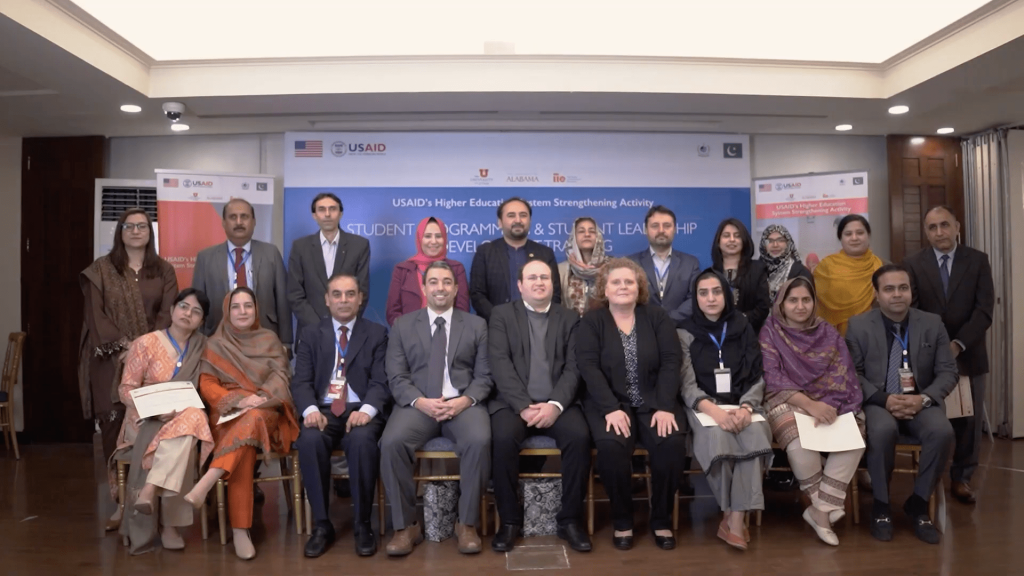
Unlocking Potential: Empowering Pakistani Graduates for a Brighter Future
Duke leader dedicates personal time to grow special USAID grant program
-By Charles Givens
July 17, 2023
Students may know Kevin D’Arco as the Senior Associate Dean of International Students with the Duke International Student Center (DISC), but they may not be aware of his work abroad as a consultant with the USAID-funded Higher Education System Strengthening Activity (HESSA).
This five-year initiative, which began in 2021, is in partnership with the University of Utah, the University of Alabama, the Institute of International Education (IIE) and multiple volunteers from across domestic colleges and universities. HESSA aims to improve the employability of Pakistani graduates. D’Arco’s role within the program involves providing one-on-one coaching and monthly trainings focused on student leadership and programming with practitioners at sixteen different universities in Pakistan.
Having been involved in the HESSA grant program for approximately a year, D’Arco dedicates around ten hours per month to this work. He also travels to Pakistan up to twice a year, fostering relationships with colleagues and practitioners alike. He recently returned to Pakistan in June 2023, which allowed him to witness firsthand the progress and challenges facing the HESSA partners.

A notable aspect of the HESSA program is its strong emphasis on assessment. By prioritizing evaluation and measurement, the program ensures that universities are equipped with the necessary tools to improve their own student leadership and programming initiatives over time. The goal is to make these universities self-sufficient in driving their students’ employability.
“THERE IS A 9-HOUR DIFFERENCE, WHICH BECOMES 10 HOURS DURING DAYLIGHT SAVINGS TIME”
No worthwhile venture is without its challenges. The time difference between the United States and Pakistan poses a significant hurdle.
“There is a 9-hour difference, which becomes 10 hours during daylight savings time,” said D’Arco. “This means that I meet with my colleagues during their work hours, which can be very early in the morning. I recognize that my colleagues are already busy, so I try to be respectful of their time, however, it is still a challenge to be up and ready to have a conversation at 5:30 in the morning.”
Nonetheless, D’Arco and his colleagues have demonstrated flexibility and adaptability when faced with political and natural disasters that have affected the program’s implementation in Pakistan. The 2022 floods were the worst in Pakistan’s history, affecting an estimated 33 million people. Entire villages were washed away, and thousands were killed.
The government of Pakistan has been in a state of flux lately. In April 2022, Imran Khan was ousted as prime minister through a no-confidence vote. He was replaced by Shahbaz Sharif, who leads a coalition government of multiple parties, though the new government has been struggling to consolidate power.
A core strength of the HESSA program lies in its ability to tailor its approach to the unique needs of each of the sixteen universities involved. This flexibility allows the program to be more effective in addressing the specific requirements of the universities and their students.
“THESE ARE ALL ESSENTIAL SOFT SKILLS THAT STUDENTS NEED TO SUCCEED IN THEIR DAY-TO-DAY LIVES.”
D’Arco says that his positive experiences within the program have been numerous, including the opportunity to engage with participants from different backgrounds and allowing for the exchange of ideas, knowledge and cultural experiences.
“Through student programming and leadership, we aim to improve students’ communication and teamwork skills,” said D’Arco. “We teach them how to set goals, set boundaries and manage their time effectively. These are all essential soft skills that students need to succeed in their day-to-day lives.”

D’Arco expressed gratitude for the opportunity to collaborate with individuals from different cultures. He highlighted the importance of this multicultural environment in fostering mutual learning and growth. Furthermore, D’Arco reiterated his belief in the program’s mission, emphasizing its commitment to improving the student experience in Pakistan.
The HESSA program stands as a transformative initiative to enhance the employability of Pakistani graduates. D’Arco’s passion for international higher education thus carries beyond Duke’s campus to assist universities and students from Islamabad to Lahore.
